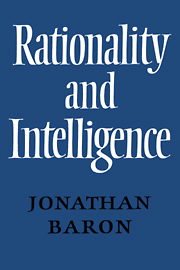Book contents
- Frontmatter
- Contents
- Preface
- 1 Introduction
- 2 Rational choices and plans
- 3 A theory of thinking
- 4 The scheme fleshed out: a decision–theoretic analysis of thinking
- 5 Conditions of effective thinking
- 6 Effects of rational thinking on the individual and society
- 7 The teaching of rational thinking
- References
- Index
2 - Rational choices and plans
Published online by Cambridge University Press: 05 October 2009
- Frontmatter
- Contents
- Preface
- 1 Introduction
- 2 Rational choices and plans
- 3 A theory of thinking
- 4 The scheme fleshed out: a decision–theoretic analysis of thinking
- 5 Conditions of effective thinking
- 6 Effects of rational thinking on the individual and society
- 7 The teaching of rational thinking
- References
- Index
Summary
Consider a student caught in a conflict between working some more on a homework problem in statistics, which he has so far failed to solve, and playing his favorite video game on his personal computer. On the first side is his desire to learn statistics, to get a good grade in the statistics course, to get into graduate school, to have a successful career, and to convince himself that he really is smarter than his sister. On the other side is his desire to play Pac-Man. The student might admit that the rational course of action would be to continue working on the problem, but he might give in to temptation anyway. In this chapter, I shall try to say why the first course might be the rational one (when it is). I want to try to say what it means to be rational in balancing expected costs and benefits when choosing alternative actions — especially when one choice involves thinking and the other does not — given one's goals. Beyond this, I shall ask what it means to have rational goals. In the next chapter, I shall use the ideas developed here to justify some prescriptive rules for the conduct of thinking. As in the present example, these rules will involve tradeoffs of different kinds of consequences of thinking or not thinking. I shall argue that the rational conduct of thinking involves a kind of expected-utility maximization.
- Type
- Chapter
- Information
- Rationality and Intelligence , pp. 50 - 83Publisher: Cambridge University PressPrint publication year: 1985



